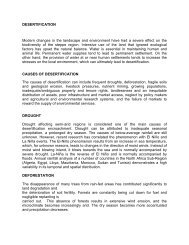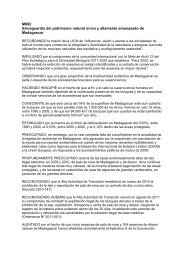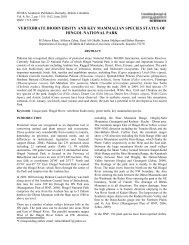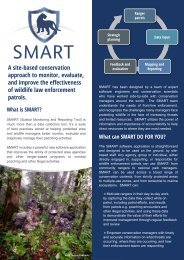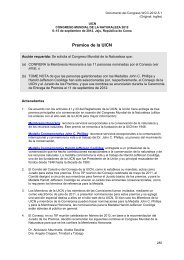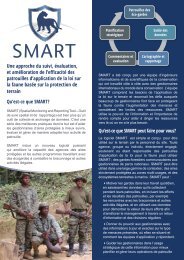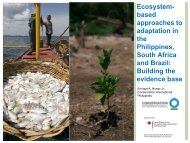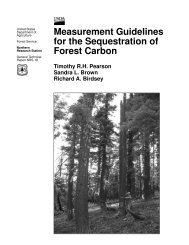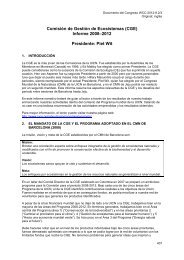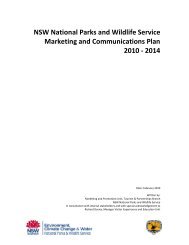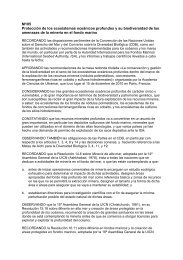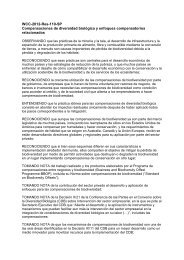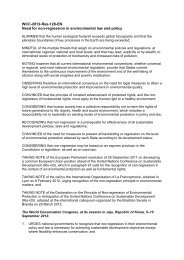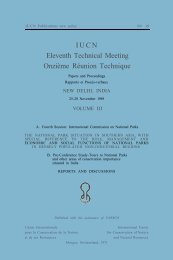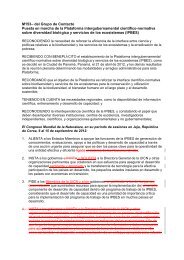WCC-2012-Res-113-EN Management of secondary ... - IUCN Portals
WCC-2012-Res-113-EN Management of secondary ... - IUCN Portals
WCC-2012-Res-113-EN Management of secondary ... - IUCN Portals
Create successful ePaper yourself
Turn your PDF publications into a flip-book with our unique Google optimized e-Paper software.
<strong>WCC</strong>-<strong>2012</strong>-<strong>Res</strong>-<strong>113</strong>-<strong>EN</strong><br />
<strong>Management</strong> <strong>of</strong> <strong>secondary</strong> environmental damage from natural disasters<br />
MINDFUL OF the significant impact on human life and the environment <strong>of</strong> natural disasters<br />
such as earthquakes, tsunamis, storms, landslides, floods, volcanic eruptions and other<br />
disasters;<br />
RECALLING that damage caused by disasters to human beings and the environment can<br />
come from the <strong>secondary</strong> damage through industrial accidents after a natural disaster;<br />
UNDERSTANDING that we cannot stop a natural disaster itself; however, we can prevent,<br />
prepare and respond to the <strong>secondary</strong> environmental damage from a natural disaster in<br />
order to reduce the frequency and severity <strong>of</strong> the damage;<br />
AWARE that many industrial zones and nuclear power plant complexes are located on<br />
watercourses exposed to flooding or coastal zones vulnerable to storms or tsunamis;<br />
AFFIRMING that all prevention measures to reduce serious adverse effects <strong>of</strong> <strong>secondary</strong><br />
industrial accidents by natural disasters on human beings and the environment are<br />
necessary;<br />
<strong>EN</strong>COURAGING the promotion <strong>of</strong> rational, economic and efficient use <strong>of</strong> preventive,<br />
preparedness and response measures to enable environmentally sound and sustainable<br />
economic development;<br />
AWARE <strong>of</strong> the necessity <strong>of</strong> a natural disaster action system through a manual for disaster<br />
emergency response, disaster recovery and ecological restoration;<br />
EMPHASIZING restoration research through consistent monitoring regarding environmental<br />
damage by natural disasters;<br />
CONSCIOUS <strong>of</strong> the role played in this respect by governments, non-governmental<br />
organizations and the public;<br />
AFFIRMING the importance <strong>of</strong> public access to information on natural disasters and<br />
subsequent industrial accidents, and subsequent measures;<br />
NOTING that <strong>secondary</strong> damage to the environment influences areas outside a single<br />
nation’s domestic jurisdiction;<br />
AFFIRMING the need to promote active international cooperation among the States<br />
concerned before, during and after an accident, to enhance appropriate policies and to<br />
coordinate action at all appropriate levels for the prevention <strong>of</strong>, preparedness for, and<br />
response to, the transboundary effects <strong>of</strong> natural disasters and subsequent industrial<br />
accidents;<br />
RECALLING the significant adverse impact <strong>of</strong> the Fukushima nuclear accident to human<br />
well-being and ecosystem services;<br />
NOTING that the Republic <strong>of</strong> Korea, Japan and China reached common recognition in May<br />
2011 after the Fukushima accident to start discussion on establishing an early notification<br />
framework in case <strong>of</strong> an emergency, exchange <strong>of</strong> experts, and to contemplate an exchange<br />
<strong>of</strong> information regarding the analysis and forecast <strong>of</strong> air-flow trajectory on a real-time basis in<br />
case <strong>of</strong> a nuclear accident;
DESIRING consensus on the role <strong>of</strong> international governmental organizations and<br />
international non-governmental organizations based on new global governance in the<br />
international environmental regime; and<br />
RECOGNIZING the importance <strong>of</strong> the early and prompt notification rule regarding natural<br />
disasters and subsequent industrial accidents, and subsequent measures for the<br />
management or mitigation <strong>of</strong> the damage;<br />
The World Conservation Congress, at its session in Jeju, Republic <strong>of</strong> Korea 6–15<br />
September <strong>2012</strong>:<br />
1. AFFIRMS that urgent action is necessary for the prevention and post-management <strong>of</strong><br />
<strong>secondary</strong> environmental damage from natural disasters;<br />
2. CALLS ON government agencies to:<br />
a. review their prevention and post-management systems for <strong>secondary</strong> environmental<br />
damage from natural disasters;<br />
b. make a manual for disaster emergency response, disaster recovery and ecological<br />
restoration;<br />
c. cooperate with other countries in the appropriate region that could be affected in the<br />
case <strong>of</strong> natural disasters and industrial accidents resulting from natural disasters,<br />
including the establishment <strong>of</strong> regional agreements for early and prompt notification<br />
and consultations;<br />
d. cooperate for the exchange <strong>of</strong> experts regarding disaster emergency response and<br />
ecosystem monitoring action; and<br />
e. recognize the right <strong>of</strong> the public to access the information provided by affected<br />
countries, taking into account also the non-discriminatory rights <strong>of</strong> the foreign public;<br />
3. CALLS ON non-governmental organizations to:<br />
a. enhance public awareness <strong>of</strong> public access to environmental information related to<br />
natural disasters and <strong>secondary</strong> damage from natural disasters;<br />
b. urge governments to develop and establish transparent and effective systems for<br />
access to relevant information; and<br />
c. hold stakeholder meetings in regional groups for discussing systems for public<br />
access to relevant information;<br />
4. CALLS ON the Director General to:<br />
a. participate in monitoring projects in ecosystems destroyed by natural disaster;<br />
b. include the issue <strong>of</strong> management <strong>of</strong> <strong>secondary</strong> environmental damage by natural<br />
disasters to biodiversity and ecological services when implementing the <strong>IUCN</strong><br />
Programme 2013–2016; and
c. contribute to the work <strong>of</strong> relevant organizations to assess the vulnerability <strong>of</strong><br />
protected areas to natural disaster and support the introduction <strong>of</strong> early notification<br />
systems; and<br />
5. REQUESTS North East Asian countries, including the Republic <strong>of</strong> Korea, China and<br />
Japan, to discuss an early notification framework in the case <strong>of</strong> a nuclear accident<br />
and/or natural disaster, as the three countries decided on 22 May 2011, as a pilot<br />
programme for this <strong>Res</strong>olution.<br />
State and agency Members <strong>of</strong> the United States abstained during the vote on this Motion for<br />
reasons given in the US General Statement on the <strong>IUCN</strong> <strong>Res</strong>olutions Process.



